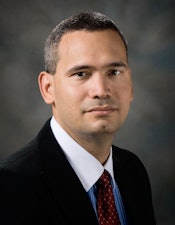
People infected with the hepatitis C virus (HCV) are two to five times more likely to develop certain head and neck cancers, according to a new study in the Journal of the National Cancer Institute.
 Harrys Torres, MD. Image courtesy of the MD Anderson Cancer Center.
Harrys Torres, MD. Image courtesy of the MD Anderson Cancer Center.This retrospective study found that the risk for HCV patients of developing head and neck cancers more than doubled for oral cavity and oropharynx cancers and increased nearly five times for larynx cancers. Patients with HCV-positive head and neck cancers were also more likely to test positive for human papillomavirus (HPV), the study showed (J Natl Cancer Inst, April 13, 2016).
"It is critical to understand that hepatitis C virus impacts not only the liver, but is a systemic infection," researcher Harrys Torres, MD, told DrBicuspid.com. "In our present study, HCV seropositivity was associated not only with nonoropharyngeal head and neck cancers but also with HPV-positive oropharyngeal cancers."
Dr. Torres is an associate professor in the department of infectious diseases, infection control, and employee health at the University of Texas MD Anderson Cancer Center.
HCV boosts oral cancer risk
About 3 million people in the U.S. are chronically infected with HCV, which has been linked to liver cancer and non-Hodgkin's lymphoma, MD Anderson researchers noted. The incentive for the study began when doctors at MD Anderson, which has a clinic devoted to managing HCV infection in cancer patients, noticed that many patients had head and neck cancer.
The study analyzed 409 head and neck cancer patients (164 oropharyngeal and 245 nonoropharyngeal cancers). The control group included 694 patients with smoking-related cancers (378 lung, 168 esophageal, 148 bladder). All patients were older than 18 years and had been tested for HCV between June 2004 and May 2014 at MD Anderson. Most patients were white males, ages 49 to 69. The median age when they were diagnosed with cancer was 62.
The researchers found that patients with hepatitis C infection had higher odds ratios of having cancer of the oral cavity, oropharynx, or larynx than those without HCV infection.
| Association between HCV infection and head and neck cancers | |
| Site of cancer | Odds ratio of cancer |
| Oral cavity | 2.43 |
| Oropharynx | 2.04 |
| Larynx | 4.96 |
Differences in cancer rates for cancers of the nasopharynx and hypopharynx were not statistically significant.
What's the connection?
The researchers were surprised at the high numbers of HCV-infected patients who also had oropharyngeal cancers and nonoropharyngeal cancers, Dr. Torres noted.
"This supports our hypothesis of a possible link between HCV and head and neck cancers," he said. "Unexpectedly, we saw a high number of HCV-infected patients with head and neck cancers and wondered whether there was an undiscovered association between having the infection and such cancers."
Previous studies have shown the presence of HCV RNA and proteins in oral cavity tissue, according to Dr. Torres. Oral lichen planus, a manifestation of HCV infection, can develop into oral cancer.
"Enhanced replication of HCV in oropharyngeal tissues may contribute to chronic inflammation predisposing to cancer development," he explained. "HPV is known to suppress local immune response, which may facilitate proliferation of HCV in the oropharyngeal cells, thereby facilitating its oncogenic action."
He noted that HPV and HCV may play a synergistic role in the development of oropharyngeal cancers by inducing loss or degradation of tumor suppressor proteins, such as p53 and the retinoblastoma (rb) protein.
One of the study's limitations is that it lacked people with HCV who did not have cancer.
"We also do not know if this association is causal -- i.e., whether the virus directly causes head and neck cancers," Dr. Torres said.
He added that a novel finding from the study was that HCV seropositivity was associated only with HPV-positive but not HPV-negative oropharyngeal cancers.
HCV drugs: A cure for some cancers?
The study raises the question: Can HCV antiviral therapies prevent or even cure some cancers?
Since antiviral drugs have recently proved to be effective at treating or eliminating HCV, they could be used to prevent or even cure HCV-related cancers, according to Dr. Torres.
Screening for HCV is important, because treating these patients with antiviral drugs may prevent diseases such as liver cancer and non-Hodgkin's lymphoma from developing, he said. It could also help patients who have already developed cancer, he added.
For patients with HCV and some indolent non-Hodgkin's lymphoma, he pointed out that National Comprehensive Cancer Network guidelines now recommend that the HCV be treated first, since it is curable. In some cases, the lymphoma has disappeared when patients are treated with HCV antiviral therapies, Dr. Torres noted.
MD Anderson will now screen and treat all head and neck cancer patients with HCV and follow their outcomes.
It is important to educate hepatology and infectious disease specialists who mainly treat patients with HCV, so they understand that HCV not only impacts the liver, but it's also a systemic infection, Dr. Torres said.
"What we are trying to make all understand is that this is an infection that has consequences -- and it's an infection we can cure," he said in an MD Anderson statement.



















